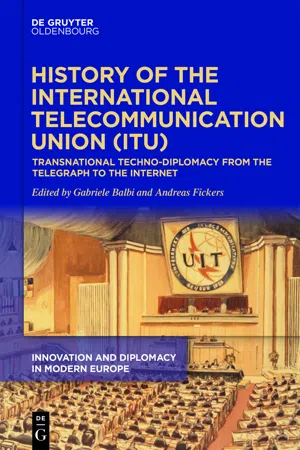
History of the International Telecommunication Union (ITU)
Transnational techno-diplomacy from the telegraph to the Internet
- 360 pages
- English
- ePUB (mobile friendly)
- Available on iOS & Android
History of the International Telecommunication Union (ITU)
Transnational techno-diplomacy from the telegraph to the Internet
About this book
This book focuses on the history of the International Telecommunication Union (ITU), from its origins in the mid-19th century to nowadays. ITU was the first international organization ever and still plays a crucial role in managing global telecommunications today. Putting together some of the most relevant scholars in the field of transnational communications, the book covers the history of ITU from 1865 to digital times in a truly global perspective, taking into account several technologies like the telegraph, the telephone, cables, wireless, radio, television, satellites, mobile phone, the internet and others. The main goal is to identify the long-term strategies of regulation and the techno-diplomatic manoeuvres taken inside ITU, from convincing the majority of the nations to establish the official seat of the Telegraph Union bureau in Switzerland in the 1860s, to contrasting the multi-stakeholder model of Internet governance (supported by US and ICANN).
History of the International Telecommunication Union is a trans-disciplinary text and can be interesting for scholars and students in the fields of telecommunications, media, international organizations, transnational communication, diplomacy, political economy of communication, STS, and others. It has the ambition to become a reference point in the history of ITU and, at the same time, just the fi rst comprehensive step towards a longer, inter-technological, political and cultural history of transnational communications to be written in the future.
Frequently asked questions
- Essential is ideal for learners and professionals who enjoy exploring a wide range of subjects. Access the Essential Library with 800,000+ trusted titles and best-sellers across business, personal growth, and the humanities. Includes unlimited reading time and Standard Read Aloud voice.
- Complete: Perfect for advanced learners and researchers needing full, unrestricted access. Unlock 1.4M+ books across hundreds of subjects, including academic and specialized titles. The Complete Plan also includes advanced features like Premium Read Aloud and Research Assistant.
Please note we cannot support devices running on iOS 13 and Android 7 or earlier. Learn more about using the app.
Information
Part I ITU as a Global Actor in the History of Telecommunications
1 The Russian Empire and the International Telegraph Union, 1856 – 1875
1.1 Introduction
1.2 “Techno-Diplomacy” and the Russian Empire
Table of contents
- Title Page
- Copyright
- Contents
- Introduction: The ITU as Actor, Arena, and Antenna of Techno-Diplomacy
- Part I ITU as a Global Actor in the History of Telecommunications
- Part II ITU as an Arena of Techno-Diplomatic Negotiations for Emerging Technologies
- Index
- Subject Index
- Person Index